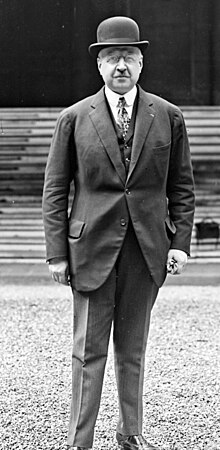Charles Reibel
He was Minister of the Liberated Regions from 1922 to 1924, responsible for efforts to restore the area of northern France that had been devastated by the trench warfare of World War I (1914–18).
He was against appeasement of Germany before the start of World War II (1939–45) and in favor of stronger defenses and greater armament.
He was awarded the Croix de Guerre, the cross of knight of the Legion of Honour and the rank of sous-intendant of the 41st Infantry Division.
The geographer Albert Demangeon called it "a zone of death, 500 km long and 10–25 km broad, following the battle front in which good land has been transformed into a desert, a wild steppe, where the very fields have erupted ... farm buildings need to be restored, agricultural equipment renewed and the fertility of the soil made anew wherever the 'cyclone' has passed.
"[4] By the time Reibel took office the emergency phase was over, but he confirmed that he was committed to "restoring normal life in the towns and villages that fell victim to the invasion."
He said the government would encourage "in every way in its power the individual and collective efforts of the brave people of northern France, notably in the form of reconstruction cooperatives.
"[5] In the spring on 1922 Reibel toured the "desert-like region" around Soupir to inspect efforts to restore land of the former "red zone" to cultivation, and based on what he saw pledged to support measures to continue to shrink the red zone and return its land to cultivation.
[6] At the beginning of 1924 Reibel stated that 55,000 hectares (140,000 acres) of farmland had been so badly disturbed that it would be many years before it could be brought back under cultivation.
[10] He said that in their present incomplete state the Belgian fortifications were "really non-fortifications" and called on the Minister of War, Louis Maurin, to support financial aid to Belgium.
[1] After the Munich Agreement was signed in September 1938 Pierre-Étienne Flandin sent a telegram of congratulations to Adolf Hitler.
[13] During the Riom Trial Reibel stated that Jacomet, secretary-general of the defense ministry, had prevented the Senate army commission from sending a mission to the front until December 1939.
[13] By June 1940 Reibel was among a group that had become convinced that an armistice was essential, others being Jean Montigny, Michel Brille, Adrien Marquet and Georges Scapini.
[1] In his 1940 apology Pourquoi et comment fut décidée la demande d'armistice (Why and how it was decided to ask for an armistice) Reibel said that General Weygand did not think the Anglo-Americans would be superior to the Germans in air power for several years, especially given that the Germans would be able to draw on French production.
[23] After the Liberation of France the jury of honor confirmed Reibel's ineligibility for public office due to his vote on 10 July 1940.
